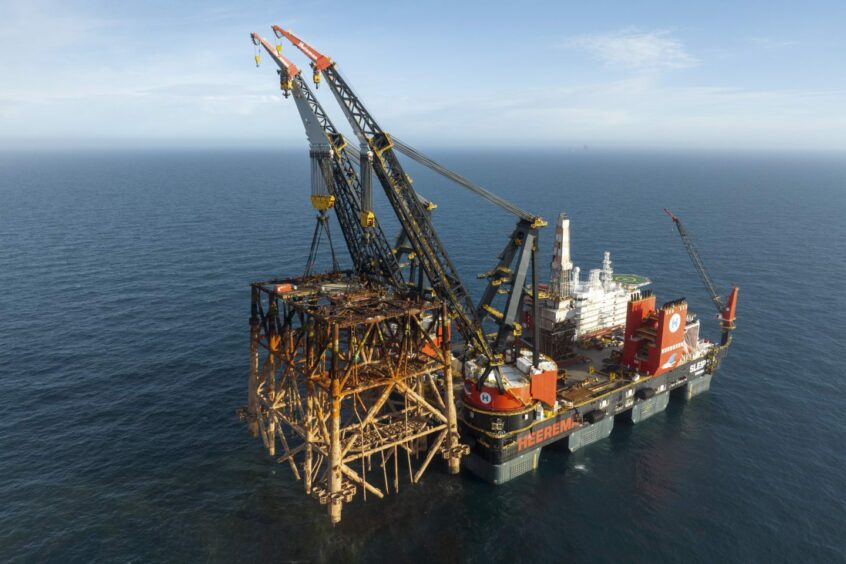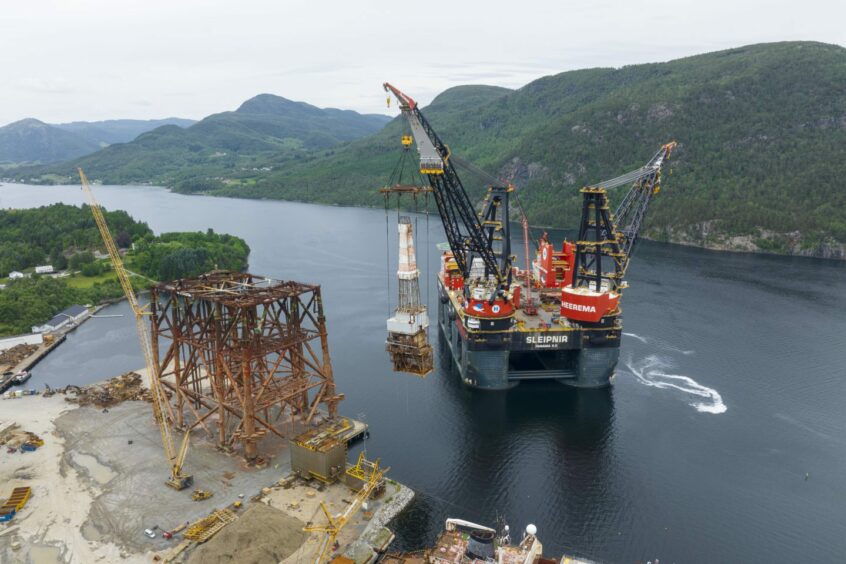
The unprecedented scale and complexity of TAQA UK’s asset decommissioning and removal programme is presenting exciting challenges as the North Sea operator plots a route to the safe, efficient and responsible execution of multiple inter-dependant projects.
Distinctively positioned in the UK North Sea as an operator now solely focused upon ultra-late-life operations and asset-wide decommissioning, TAQA UK has already proven its capabilities with the successful removal of the 36,000 tonne Brae Bravo topsides and 11,000 tonne upper main jacket over the past two years.
Now a much wider programme is gathering pace as TAQA UK transitions four of its seven remaining assets towards cessation-of-production (CoP) in 2024, with the remaining three moving towards CoP before the end of 2027.
Moreover, the operator’s people and partners are central to its success.
An exhaustive process of planning, preparation and execution
Decommissioning and Projects Director David Wilson explains: “The programme entails an exhaustive process of planning, preparation and execution across several large-scale activity sets. These include, but are not confined to, substantial regeneration of drill rig capabilities on several assets, simultaneous well decommissioning campaigns on three of our platforms, and major de-energisation and disembarkation programmes for each asset to remove hydrocarbons and energy sources before assets are made safe for disembarkation”.
These activities all take place ahead of the preparation for removal and sustainability-focused disposal of the physical infrastructure.
In addition, in 2025 TAQA will begin a wells decommissioning campaign lasting over four years and covering 52 subsea wells, as a precursor to the removal of the subsea infrastructure activities.
Forging ever-closer connections with an evolving supply chain
TAQA UK’s activities at the forefront of North Sea decommissioning are also helping to redefine a changing market landscape for services companies that have traditionally supported oil and gas operations but are increasingly turning their attention to opportunities in other areas of the sector, including decommissioning.
Early engagement and close collaboration with supply chain partners and other industry stakeholders are important elements of TAQA UK’s plan.
TAQA UK’s Legal, Commercial and Business Services Director Sandy Hutchison says: “We’ve put our relationships with the supply chain community front and centre of our planning from the outset, and we believe that approach is reaping rewards for both TAQA and the companies that are joining us on our journey.
“Many of our long-term strategic contractors who are presently delivering operational support on our assets, and some of whom have worked with us for many years, will continue to support us through CoP and beyond. Some of their scopes will evolve and adapt a little to reflect a changing work environment and ensure we safely exit our assets.”
Opportunities for supply chain companies to evolve and grow
TAQA UK’s approach to decommissioning is demonstrating that many new opportunities exist for supply chain companies, with TAQA currently and with other North Sea operators in the future.
“It’s not only our people who are building their skills in ultra late-life operations and decommissioning for their post-TAQA careers – our supply chain partners also have the opportunity to broaden their skills and experience, and to evolve and grow their specialist capabilities with us,” says Mr Wilson.
TAQA’s innovative and progressive approach in the contracting arena is already evident in the company awarding Allseas the largest single offshore decommissioning contract in the UK North Sea to date. This covers the removal and disposal of its four Northern North Sea assets – Cormorant Alpha, North Cormorant, Eider and Tern – and comes with a target of having 95% of the materials from the four assets either reused or recycled.
TAQA’s approach also includes an element of flexibility for the contractor around the removal dates of individual assets, to enable Allseas to schedule them within its longer-term work planning. This reflects one of the key principles shaping TAQA’s supply chain engagement.
Mr Hutchison says: “We recognise there needs to be greater collaboration at an industry level, given the resource constraints caused by the ever-greater competition globally for supply chain plant, equipment and services.
“For our part, we want to leverage the flexibility that large-scale decommissioning programmes allow for. Our NNS asset removal contract, for example, shows we’re receptive to accommodating larger execution windows whenever feasible, to help flatten the demand curve.
“More widely, we’re also committed to the North Sea Transition Authority’s stewardship expectation around supply chain collaboration. It promotes the visibility of upcoming work and helps companies to plan ahead, and we’re fully behind such initiatives.
“Alongside our long-standing commitment to OEUK’s supply chain principles, it underlines our credentials in this key area.”
Collaboration is key
Throughout its 16 years as a UK North Sea operator, TAQA has sought to work together with supply chain companies and other operators wherever possible to maximise efficiency and to meet shared challenges.
Over that period, it has instigated and participated in resource-sharing initiatives in areas ranging from the deployment of emergency response and rescue vessels and offshore transportation services to subsea campaigns.
In more recent times it has looked to work with vendors to alleviate the challenges posed by an inflationary environment for costs.
“We recognise the expectation of regulators that we manage and control costs responsibly and, amid the external pressures that are impacting those costs, we are doing what we can to maintain discipline around them in the contracting environment,” adds Mr Hutchison.
TAQA UK is maintaining that collaborative industry approach as it moves ahead on its decommissioning journey – it recently participated, for example, in a multi-operator campaign to decommission historic exploration and appraisal wells, securing significant efficiencies while also presenting an opportunity of scale for the successful contractor.
“We appreciate that projects of scale can present a challenge as well as an opportunity for prospective contractors, so we try to inject some optionality into our tendering strategies and work with contractors to adapt our approach when in our mutual interests,” he says.
“That might, for example, enable supply chain companies to bid for part of the scope and become part of a multi-vendor solution package. It also potentially provides us with a wider range of solution options which helps us to land on the optimum outcome.
“It further demonstrates the value of early contact, collaboration, and taking time to understand the demands and pressures within the supply chain, which has responded in a really positive way to our engagement strategy.
“That in turn has helped us develop sustainable relationships with the companies that will work with us over the coming years.”
The next big milestone on TAQA UK’s decommissioning route will be the anticipated issue of the invitation to tender for the removal and disposal of its Brae Alpha platform – a bigger project than the Brae Bravo campaign.
“We’re also engaging with the supply chain to explore the options around the decommissioning of our Harding platform, which is due to CoP in 2027,” adds Mr Wilson.
“The unusual three-legged jack-up rig structure presents some very distinct removal challenges, so we’re keen to bring on board ideas and suggestions from specialist vendors that enable us to identify the best execution strategy.”
TAQA UK has been an active participant in both the OEUK’s 2023 Working as One Supply Chain Collaboration Survey, which provides for an assessment of the health and extent of the culture of collaboration across the industry, and the latest Decommissioning Insights report, which will be launched at the OEUK Offshore Decommissioning Conference in November.
“As the company that is pioneering large-scale, multiple-asset decommissioning activities in the UK North Sea, we believe we should take every opportunity to contribute to the sharing of knowledge and experience with stakeholders,” says David.
“That experience and insight lies, of course, with our people and our partners throughout the supply chain. Together we are building skills, experience and capabilities across ultra-late-life operations and decommissioning, whether it be on specific projects or managing our ongoing business.
“Our people are instrumental in moving our strategy forward, performing critical roles for us today, but also positioning themselves to capitalise on new professional opportunities in the future.”
Recommended for you

 © Supplied by Taqa
© Supplied by Taqa